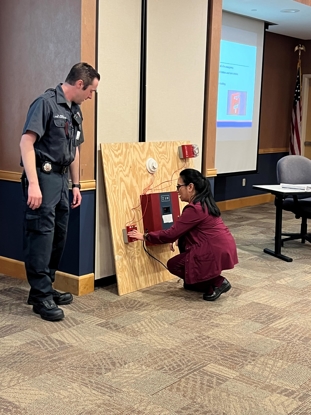Back-to-School Tips for Kids from Parrish Healthcare Sleep Medicine Experts
- Category: Community, Parrish Healthcare Sleep Center
- Posted On:

TITUSVILLE, FLA. (August 8, 2025)—As students head back-to-school, Parrish Healthcare sleep medicine experts stress the importance of good sleep routines to support academic success. Studies show that kids need more sleep than adults. While adults need seven to nine hours of sleep per night, the National Sleep Foundation and American Academy of Sleep Medicine say that kids ages five to 12 need nine to 12 hours of sleep, while teenagers need eight to 10 hours of sleep to function at their best.
“Sleep is foundational to a child’s success both in and out of the classroom,” said Eduardo Hernandez, Manager of Parrish Healthcare’s Sleep Disorders Center. “Unfortunately, many children struggle with sleep issues that can negatively impact their mood, attention span and academic performance.”
Sleep disruptions are common in children of all ages and can lead to serious behavioral, social and educational consequences. Signs that a child may be experiencing a sleep disturbance may include snoring, sleepwalking, sleep talking, night terrors, teeth grinding, continued movement during sleep and bedwetting. Children who experience sleep disturbances may appear irritable, cranky or may have trouble managing their emotions.
- Behavioral Concerns: Poor sleep is linked to hyperactivity, impulsiveness and defiance.
- Cognitive Difficulty: Lack of sleep can negatively affect attention, memory and decision-making.
Parents and caregivers can promote good sleep habits by taking the following steps:
- Establish a bedtime routine: Set consistent bedtimes and wake-up times, even on the weekends. This aligns the body’s internal clock (circadian rhythm) and helps the body consistently anticipate when it should start winding down or waking up. Circadian rhythms are easily disrupted and can take several days to fix so consistency is key. Additionally, children benefit from a predictable bedtime routine that is the same every night.
- Create a soothing sleep environment: Keep bedrooms cool, dark and quiet. According to the National Sleep Foundation, the recommended bedroom temperature for optimal sleep is between 60°F and 67°F.
- Limit screen time before bed: This includes turning off TVs, video games and tablets at least one hour before bedtime. Screens emit blue light, which suppresses the brain’s release of melatonin (the hormone that makes you feel sleepy). Exposure to blue light so close to bedtime may stimulate the brain and prevent a child from feeling tired even when they are.
- Avoid caffeine: Caffeine is hidden in sodas, iced tea and some candies (including chocolate) and can interfere with the ability to both fall asleep and stay asleep.
- Only use the bed for sleeping: Our brains regularly form associations based on environments. If your child consistently uses their bed for things other than sleeping, such as homework or screen time, their body’s mental connection, associating their bed with sleep, may weaken. This can make it harder for them to fall asleep and stay asleep.
Parents are also encouraged to talk to their children about the importance of sleep and to monitor for any unusual sleep behaviors, daytime drowsiness or hyperactivity. “If your child is frequently tired during the day or begins a pattern of having trouble falling or staying asleep at night, it may be time to speak with a sleep professional,” added Hernandez.
Parrish Healthcare’s Sleep Center is conveniently located at Parrish Healthcare Center in Port Saint John and remains committed to helping families throughout Brevard achieve restful, healthy sleep. If you suspect your child may have a sleep disorder, consult with your pediatrician or contact Parrish Healthcare’s Sleep Center for more information at (321) 268-6408 or by visiting parrishhealthcare.com/sleep.



